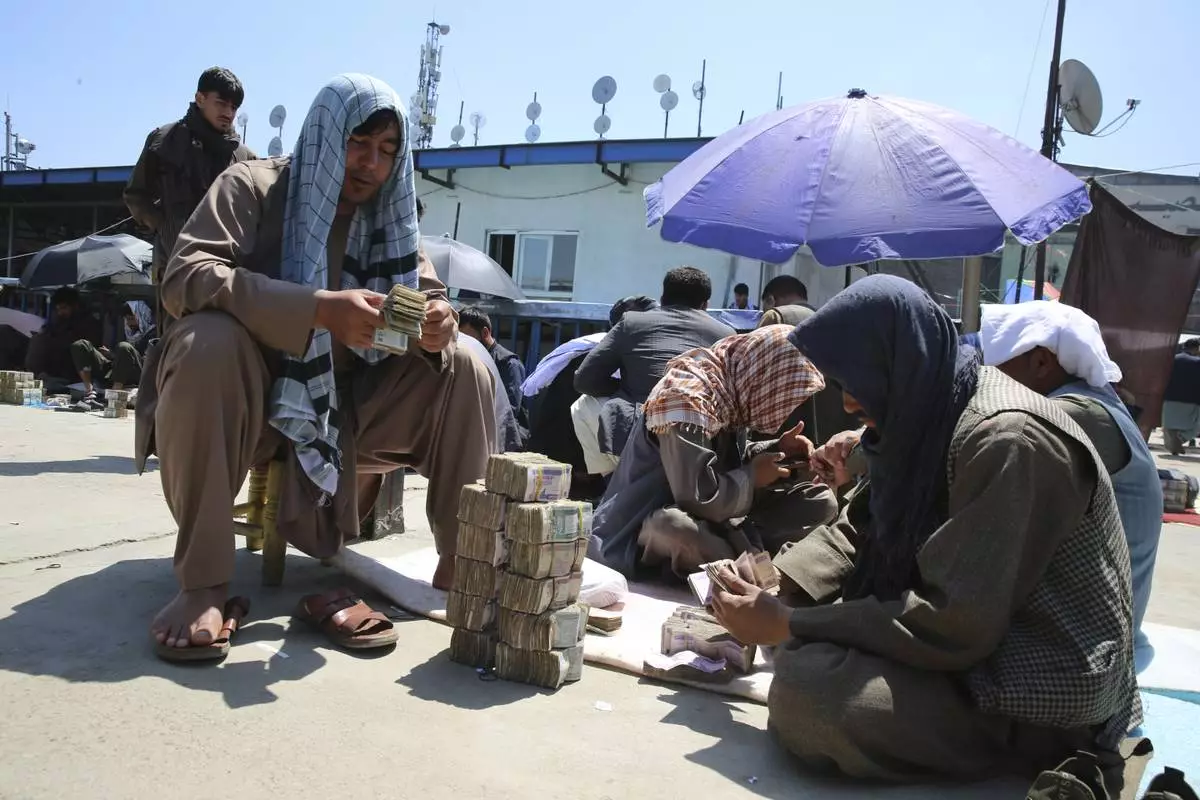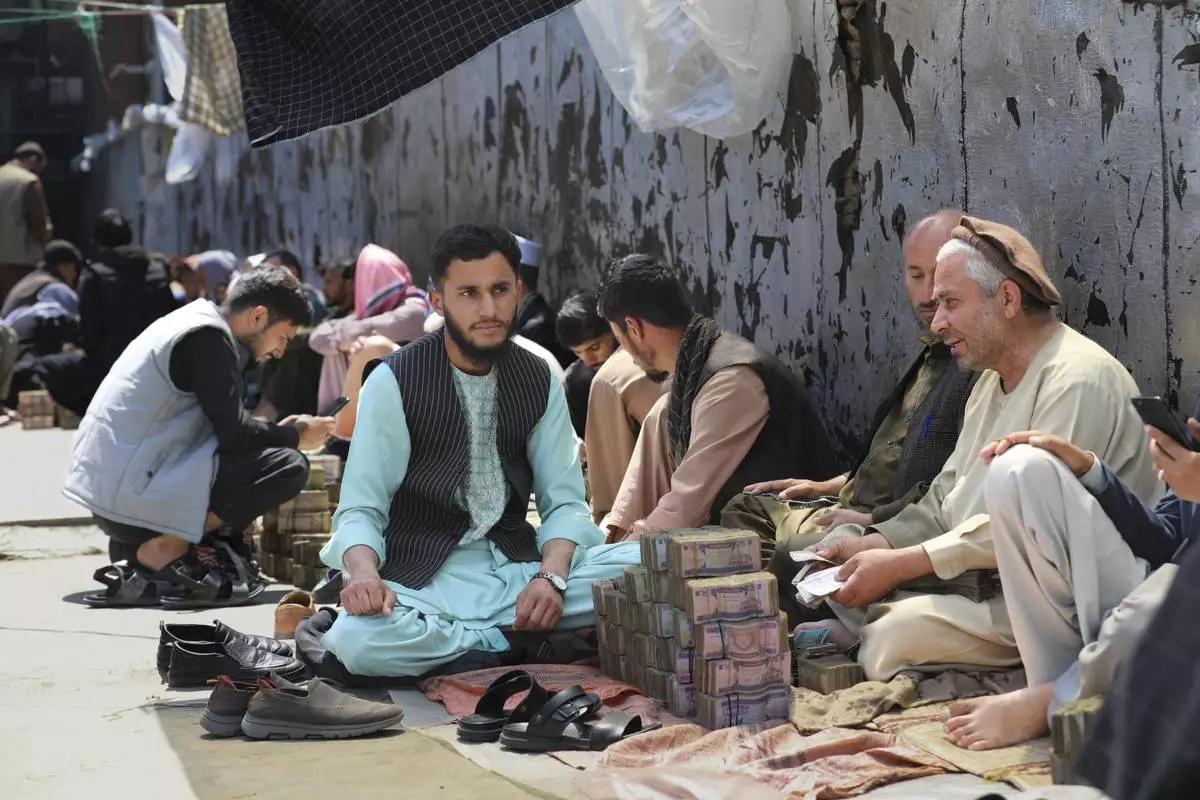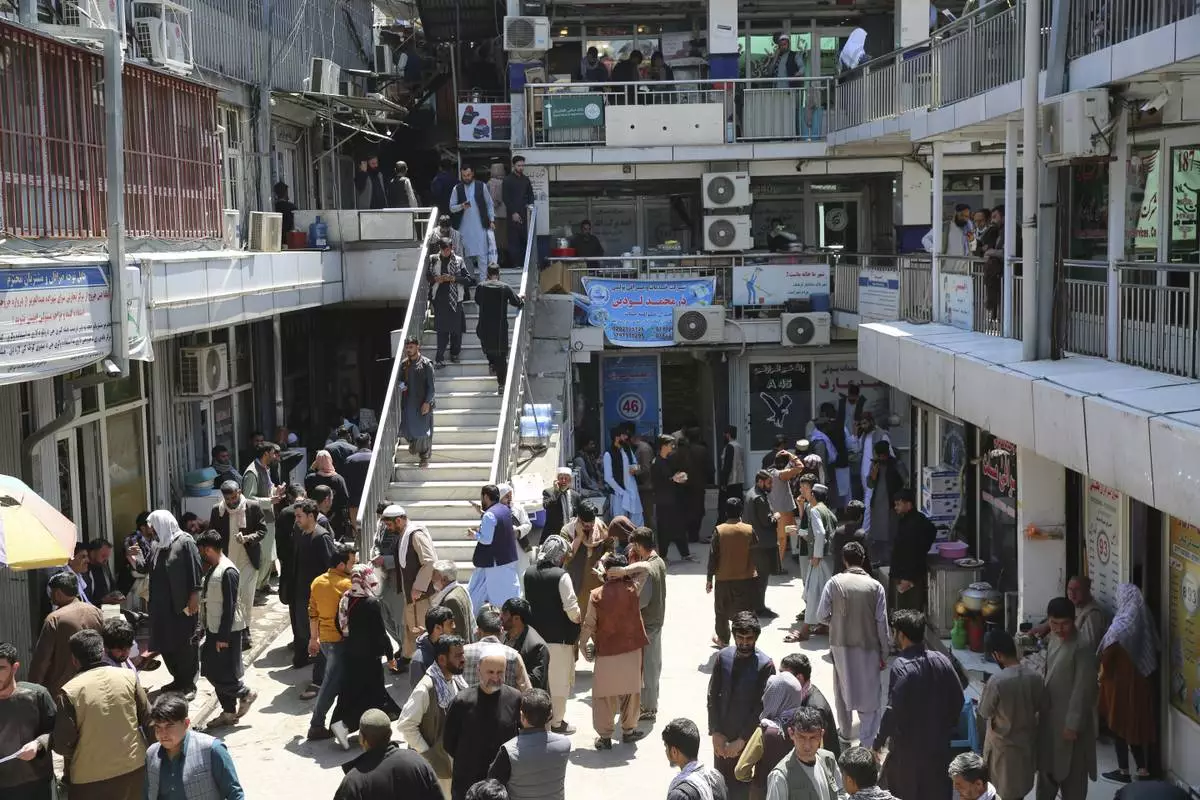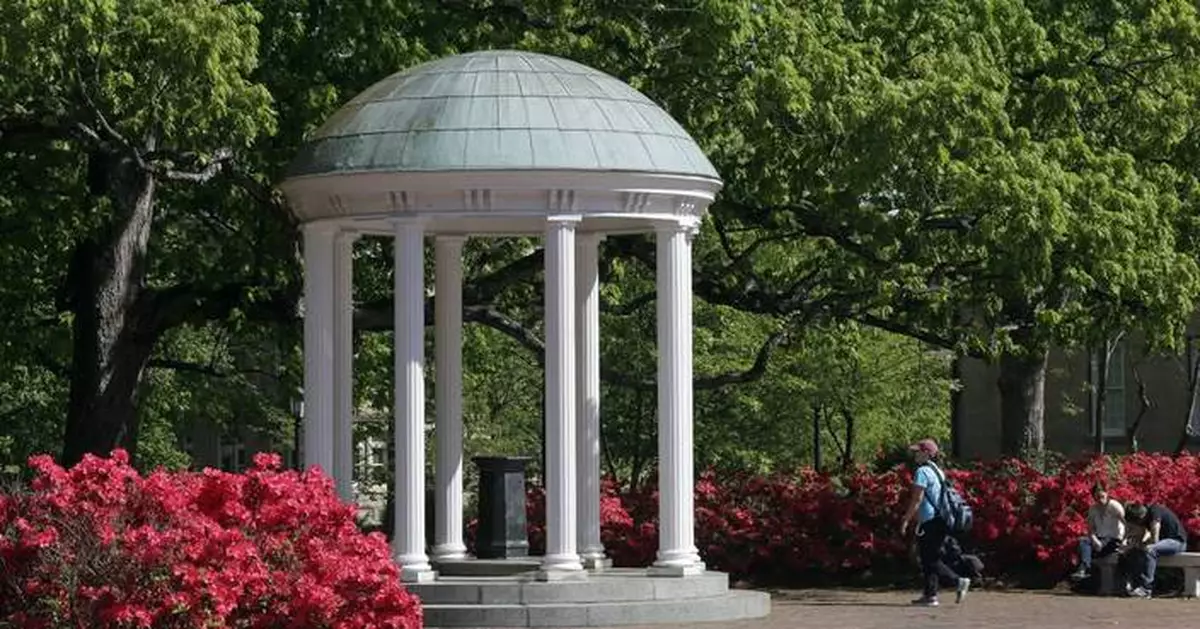RALEIGH, N.C. (AP) — The future of diversity, equity and inclusion staff jobs in North Carolina's public university system could be at stake after a five-person committee swiftly voted to repeal a key policy Wednesday.
The Committee on University Governance, within the University of North Carolina Board of Governors that oversees 17 schools, voted in less than four minutes to reverse and replace a policy related to DEI. The full board of 24 members is to vote on the matter again next month, and if approved, the repeal would take effect immediately.
If the policy is fully repealed, the UNC system could join other major universities in dismantling their diversity offices. Among the most notable, the University of Florida in Gainesville announced in a memo last month that it was scrapping its office and shifting its funding for faculty recruitment instead.
In Texas, universities saw major cuts in their diversity and inclusion staff in 2024 in compliance with a state ban signed into law last year. The state higher education board in Kansas was also to address a ban on diversity initiatives in hiring staff and accepting students Wednesday.
At least 20 states have seen Republican bill proposals seeking to limit diversity and inclusion programs in several public institutions such as universities.
Diversity, equity and inclusion is defined by the American Psychological Association as a framework to guide “fair treatment and full participation of all people,” especially those belonging to minority groups. It has become a recurring point of contention for conservatives who argue DEI programs are discriminatory.
The proposed policy change, first reported by The News & Observer of Raleigh, would impact a diversity, equity and inclusion regulation adopted in 2019. It defines the roles of various DEI positions — such as a system office diversity and inclusion liaison and diversity officers across the university system — and the establishment of a diversity and inclusion council made up of members representing each university, according to the policy.
Under the policy, the officers’ responsibilities include assisting the chancellor with diversity policy and programming, in addition to facilitating training for students and staff.
But Andrew Tripp, senior vice president for the UNC System Office’s legal affairs team, said the change would reaffirm “the university's commitment to non-discrimination and institutional neutrality.”
The policy that could replace the existing regulation does not include the outlined responsibilities of DEI officers and liaisons, suggesting they may be eliminated. Other inclusion efforts such as tracking the university's diversity metrics and giving reports to university boards will continue, the replacement policy said.
UNC-Chapel Hill — the system's flagship campus and whose website says has an office for diversity and inclusion with a 12-person staff — will review the policy change and work with the university system if implemented, spokesperson Kevin Best said in an emailed statement.
“As the Board of Governors noted, equality of opportunity in education and employment is a long-standing commitment of the University of North Carolina as a core value in service to our vibrant and growing state,” Best said. “As part of that mission, UNC-Chapel Hill will continue to welcome people from all walks of life with a variety of experiences and perspectives who come here to learn, work and live.”
Immediately after the vote to repeal the diversity policy with no questions or discussion, the governance committee went into closed session, according to the agenda. Closed sessions are not subject to public record, according to state statutes.
Efforts to dissolve university diversity efforts are a “disservice” to students and create “controversy and volatility," former UNC System President Tom Ross said in a joint statement with Democratic Gov. Roy Cooper after the vote. Instead, Ross, who served as president from 2011 to 2016, said universities should celebrate diversity.
"Republican legislative and university leaders who attack diversity at our public universities are failing in their duty to protect students while threatening our ability to recruit top scientists, researchers and innovators who power our economy,” Cooper said.
However, conservative-leaning advocacy group Carolina Partnership for Reform said in a statement the new policy would “go a long way toward rooting out DEI bureaucracies."
The full UNC Board of Governors is scheduled to meet May 22-23 in Raleigh. Members of the board are elected to four-year terms by the state Senate and House of Representatives, which Republicans have controlled since 2011.
Republican House Speaker Tim Moore said fellow Republicans have expressed interest in taking up anti-DEI legislation in the session opening next Wednesday. He recently told reporters the legislature may allow the university boards to review their diversity policies first before introducing any bills.
“It's still at the conversation stage,” Moore said.

FILE - The Old Well on the University of North Carolina at Chapel Hill is seen among the spring foliage, April 20, 2015, in Chapel Hill, N.C. The future of diversity, equity and inclusion staff jobs in North Carolina's public university system could be at stake as a series of votes loom on a key policy's potential repeal. The Committee on University Governance within the University of North Carolina Board of Governors that oversees 17 schools, was poised to vote Wednesday, April 17, 2024, on a possible reversal and replacement of a policy related to DEI. (AP Photo/Gerry Broome, File)
KABUL, Afghanistan (AP) — Yunis Safi, a businessman in Kabul, knows very well the importance of showing off your phone if you want something done.
“In Afghanistan, your phone is your personality,” he said, smiling, a jewel-encrusted ring on each hand. One boasts an emerald, the other a fat Russian diamond. “When you go to a meeting with the government, the better your phone, the more they respect you.”
Safi runs a phone shop in the posh Shar-e-Naw neighborhood. An armed guard stands outside. The iPhone 15 Pro Max adorns the shop shelves, retailing for $1,400. He has customers ready to part with this sum of money, which may come as a surprise to some given the country’s economic woes and more than half the population relying on humanitarian aid to survive.
Afghanistan’s finances were on shaky ground even before the Taliban seized power in 2021. The budget relied heavily on foreign aid and corruption was rife. The takeover sent Afghanistan’s economy into a tailspin, billions in international funds were frozen, and tens of thousands of highly skilled Afghans fled the country and took their money with them.
But, even amid difficult conditions, some businesses are making money out of Taliban rule. Women are reduced to customers, however, as authorities have barred them from most jobs, including retail. None of Safi's 78 staff are women.
He has tapped into a diverse consumer base — the ones hungry for the latest iPhone release and those happier with simple handsets, which make up the bulk of his sales and sell for between $20 and $200.
The Taliban used to attack phone towers and threaten telecom companies, accusing them of colluding with United States and other international forces in helping track insurgents' movements through mobile phone signals. Now, they’re investing in the 4G mobile networks.
The Communications Ministry says 2 million new SIM cards have been issued in the past two years and that subscriber numbers are increasing. Ministry spokesperson Enayatullah Alokozai said the government was plowing $100 million into the telecom sector and had fully restored hundreds of towers.
There are 22.7 million active SIM cards in a country of 41 million people. Of these, 10 million are for voice calls and the rest are for mobile internet.
According to Trade Ministry figures, phone imports have risen. More than 1,584 tons of phones came into Afghanistan in 2022. Last year, it was 1,895 tons.
Safi said he has many Taliban customers and it’s the younger ones who prefer iPhones. “Of course they need smartphones. They use social media, they like making videos. The iPhone has better security than Samsung. The camera resolution, processor, memory are all better. Afghans use their smartphones like anyone else.”
Safi has the iPhone 15 Pro Max, wears an Apple Watch Ultra and owns three cars.
Business was bad immediately after the Taliban takeover but it’s improving, Safi said. “The people buying the new release iPhones are the ones with relatives abroad sending money to Afghanistan.”
Remittances are a lifeline, although they’re less than half of what they were before the Taliban took power and the banking sector collapsed.
At the raucous Shahzada Market in Kabul, hundreds of money exchangers clutch stacks of the local currency, the afghani, and noisily hawk their wares. They occupy every floor, stairwell, nook and cranny.
Abdul Rahman Zirak, a senior official at the money exchange market, estimates that $10 million changes hands daily. The diaspora sends mostly U.S. dollars to families, who exchange it for the afghani.
There used to be more ways to send money to Afghanistan before the Taliban seized control. But there are no more links to SWIFT or international banking and that’s a major reason why business is brisk at the market, he said.
“The work of money exchangers has increased and strengthened,” Zirak said. “Money transfers come from Canada, the U.S., Europe, Australia, Arab nations and other neighboring countries.”
Trade becomes hectic during the holidays. During the holy month of Ramadan, 20,000 people visited the market daily and it took more than 90 minutes to enter, he said.
“If the sanctions are removed and the assets are unfrozen, then maybe our business will decrease. But I don’t see that happening. Many don’t have bank accounts. Unemployment is high, so people send money to Afghanistan. Our business will be needed for years to come.”
Irfanullah Arif, who runs Haqqani Books, a specialist retailer of Islamic texts, is also upbeat about his fortunes. The majority of his customers are teachers and students at religious schools, or madrassas.
There are at least 20,000 madrassas in Afghanistan. The Taliban want to build more. Last year, the supreme leader reportedly ordered the recruitment of 100,000 madrassa teachers.
While Arif’s business suffered like everyone else’s in the chaotic aftermath of the takeover, there was another reason. “All the students left the madrassas and went to work for the (Taliban) government,” said Arif.
The Taliban’s push for religious education has given him some relief. Last year, he sold 25,000 textbooks.
But there’s a price to pay for success. Arif imports everything and the Taliban are laser-focused on collecting revenue, even on Islamic literature.
Arif pays a tax of 170 afghanis ($2.36) on a carton of 100 books, the shipping cost for which is 500 afghanis ($6.95). Taxes on his bookstore have tripled under Taliban rule.
“That’s why books are expensive in Afghanistan,” he sighed. “With the increase of madrassas, our trade has gone up, but so have the taxes.”

Afghans buy mobile phones in Kabul, Afghanistan, on Tuesday, April 23, 2024. (AP Photo/Siddiqullah Alizai)

Afghans read books in a specialized religious bookstore in Kabul, Afghanistan, Wednesday, April 24, 2024. (AP Photo/Siddiqullah Alizai)

Afghan money changers wait for customers at a currency exchange market in Kabul, Afghanistan, Monday, April 22, 2024. (AP Photo/Siddiqullah Alizai)

Afghan money changers wait for customers at a currency exchange market in Kabul, Afghanistan, Tuesday, April 23, 2024. (AP Photo/Siddiqullah Alizai)

Afghans walk around a downtown currency exchange market in Kabul, Afghanistan, Monday, April 22, 2024. (AP Photo/Siddiqullah Alizai)

Afghans read books in a specialized religious bookstore in Kabul, Afghanistan, Tuesday, April 23, 2024. (AP Photo/Siddiqullah Alizai)
















